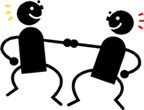One of the fastest ways to attract clients is to become known as the expert by speaking to groups. Yet, most people would rather be pushed from an airplane than get up in front of a group and speak. No one was ever born a natural speaker. When you watch dynamic speakers, it may seem as if they deliver their speech effortlessly. The ease with which they deliver their speech is the result of many hours of preparing and rehearsing.
I love speaking to groups, sharing my sales and marketing strategies to help them grow their businesses. Believe me; it wasn't always this way for me. It wasn't too long ago that the thought of getting up in front of a group paralyzed me. I laid awake many nights worried about how I'd come across. What would they think of me? What if they're not interested in what I have to say? What if I forget what to say? After years of practice, preparation, and training, my confidence increased and I became an effective speaker.
Let's take a look at the world of speaking and what the benefits are to you.
- When you become a speaker, you immediately elevate yourself in the eyes of the audience. They see you as the expert and this establishes instant credibility.
- You're reaching more than one person and that increases the chances of more people interested in your service or product.
- Your confidence increases. As your speaking improves, the most powerful benefit is the improvement in your general confidence and self-image.
- Research shows that in selling, a speech demonstrating your services is 50% more effective than the most glowing testimonial. You're showing the audience first hand how you think and work.
- When you're speaking, the audience has come to you rather than you having to find them.
What makes a great speaker?
I saw Suze Orman, the financial guru, speak at a conference. As soon as she walked on stage, she connected with us. She was down-to-earth, funny, and knowledgeable. She shared her own personal story of growing up in Chicago, working as a waitress for several years making only $400 a month. Although she has achieved great success and fame, she had her ups and downs just like you and me. Because she shared authentically from her heart, she had us all sitting on the edge of our seats listening to every word she said.
Here's 10 valuable tips to draw the audience to you from the beginning to end of your talk.
- Know who's in your audience before you speak. Call the event or program planner to find out the profile of the people attending.
- Arrive early before you speak and walk around introducing yourself to some of the people. This helps to relax you and get you related to them.
- If you're speaking for a half-hour to an hour, your talk should cover only 3-4 points. The audience can only retain a limited amount of information in a short period of time.
- Let the audience know at the beginning what you'll be talking about and how long you'll be speaking.
- Speak to only one person at a time for about 4-5 seconds. Don't look over their heads. Speak to them. This helps to reduce nervousness, increase confidence, and connect with the audience.
- Create a compelling memorable story. People are interested in "you." By sharing a memorable story, you're connecting with the audience at a more personal level. They now will feel more related to you and what you have to say.
- Engage the audience throughout your presentation and make it interactive. Check in with them by asking questions. It's much more fun when you include them.
- Throughout your talk, share other stories about people who you helped and the results. People love to hear real-life stories of triumph and success.
- End your talk with a "call to action." What do you want as an outcome for your talk? Do you want the audience to take an action step? Do you want them to buy your product or service?
- Capture your audience. If you want to keep in touch with them, offer to send them notes from your talk or give a gift if they give you their business cards.
 Early on in my business, I was networking with everyone with no special focus. When I first started my business, I was a “Jill of all trades.” My business was new and I was open to coaching anyone who asked. I was doing this because I was eager to help people, grow my business, and hone my coaching skills
Early on in my business, I was networking with everyone with no special focus. When I first started my business, I was a “Jill of all trades.” My business was new and I was open to coaching anyone who asked. I was doing this because I was eager to help people, grow my business, and hone my coaching skills

